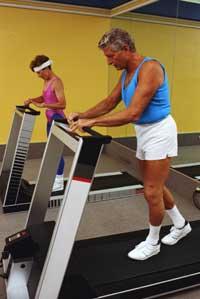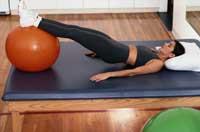Healthy sport and income source

To be well physically it is advised that everyone does sport in his or her measure, but there are also rumors that stirring muscles helps to be well psychologically. However, in order for this to be so it is necessary to regain strength and for this there is no need to eat or drink anything.
September is a propitious month for many to start doing sports, but it is common for work and winter darkness to hook you in the office or you prefer to be in the heat of the sofa. Well know that in stressful or psychologically painful times it is most convenient to do sport.

The rumor that exercise practice is an antidepressant solution was extended long ago and thanks to two recent research has been scientifically proven. But what is the relationship between sports practice and positive attitude? Both research has shown that sports practice affects the number of hormones directly related to stress.
The first research was conducted with 20 healthy students. After 24 hours without practicing sport they have made them run 30 minutes. And thanks to the studies of urine before and after sports practice, everything is a matter of hormone. The brain uses the molecule known as phenyletilamine to regulate the amount of dopamine and norepinephrine that act in stress.
What happens is that doing sports stimulates the production of this molecule and, therefore, feels happier. This molecule is prescribed by doctors as antidepressants when they are not affected by other medications, so scientists believe it would not be a bad idea to order sports practice instead of pressing antidepressants.

Researchers Camille Buting and Homer Tolson of A&M University of Texas have conducted the second research with athletes and non-athletes between 20 and 49 years. This research has also been based on urine studies, presenting similar but more accurate results. According to researcher Buting, "stress affects two levels: emotional and physical." It is an epinephrine hormone that affects psychological stress and a norepinephrine hormone that acts physically. In people with physical and emotional problems, there is also a third hormone, cortisol.
In this research, urine studies have shown that the number of these hormones is significantly different between athletes and non-athletes. Non-athletes have seen that these hormones are found in a much larger number. Thus, it has been shown that sports practice not only benefits the muscular system but also the response to stress.
Feeding of the athlete
Doing sports is healthy, but only in appropriate conditions. To practice sport it is essential, on the one hand, that each one act at his pace and, on the other, that he feeds well. In fact, the strength of doing sport receives from the feeding the bodies and the health of the athlete, the ability to recover strength and heal wounds, are related to feeding. Of course, from this diet you have to reduce the maximum alcohol.

Not all athletes will have the same diet, but in general you have to have a balanced diet. A diet of 12-15% protein, 23-30% lipids and 55-60% glycosides is the most suitable for athletes. The main sources of protein are meat, fish, milk, gas and soy. Lipids are the main source of energy for subsistence sports. Lipids can be of animal origin (butter, some fish, eggs, gasnas, charcuterie) or vegetable (oils, olives...).
Glucids (sugars) are the main source of energy for high efforts. Two types of glucids are distinguished: the simple ones, which are found in fruits, vegetables and candies, and the complexes glucids, which are found in cereals, potatoes and legumes. It is preferable to eat whole grains because they have more fiber and are rich in vitamins of group B.
Take care of the drink
But eating is not enough, you have to drink. An intense physical effort for an hour can lead to losing three quarters of the amount of water the body has. Contains mineral salts (mainly sodium and potassium) and carbohydrates. If we do sport to measure, to recover lost forces, just drink water and eat something. But since the 60s, hardened athletes have other wonderful products to regain their strength: the so-called energy drinks.

These drinks contain, in addition to water, other mineral salts, more vitamins, complex polymeric acids and amino acids. Despite the intense debate about whether food is balanced and better than water, its consumption has increased dramatically. According to a new market study, energy drinks of more than 30 flavors can be found. The sports drink sector is the one that has grown the most in the gas beverage industry and regularly consumes a third of American adults. The marketing kings also have an argument in their favor. Studies show that the consumption of these drinks is beneficial if you practice sports for more than an hour.
Published in 7K.
Buletina
Bidali zure helbide elektronikoa eta jaso asteroko buletina zure sarrera-ontzian











